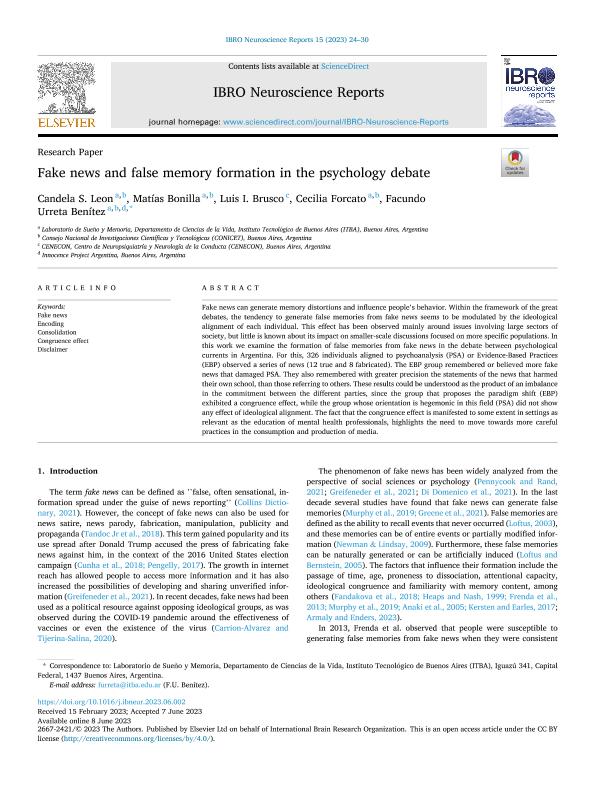Mostrar el registro sencillo del ítem
dc.contributor.author
León, Candela Sofía

dc.contributor.author
Bonilla, Matías

dc.contributor.author
Brusco, Luis Ignacio

dc.contributor.author
Forcato, Cecilia

dc.contributor.author
Urreta Benitez, Facundo Antonio

dc.date.available
2023-12-12T18:11:25Z
dc.date.issued
2023-12
dc.identifier.citation
León, Candela Sofía; Bonilla, Matías; Brusco, Luis Ignacio; Forcato, Cecilia; Urreta Benitez, Facundo Antonio; Fake news and false memory formation in the psychology debate; Elsevier; IBRO Neuroscience Reports; 15; 12-2023; 24-30
dc.identifier.issn
2667-2421
dc.identifier.uri
http://hdl.handle.net/11336/220051
dc.description.abstract
Fake news can generate memory distortions and influence people's behavior. Within the framework of the great debates, the tendency to generate false memories from fake news seems to be modulated by the ideological alignment of each individual. This effect has been observed mainly around issues involving large sectors of society, but little is known about its impact on smaller-scale discussions focused on more specific populations. In this work we examine the formation of false memories from fake news in the debate between psychological currents in Argentina. For this, 326 individuals aligned to psychoanalysis (PSA) or Evidence-Based Practices (EBP) observed a series of news (12 true and 8 fabricated). The EBP group remembered or believed more fake news that damaged PSA. They also remembered with greater precision the statements of the news that harmed their own school, than those referring to others. These results could be understood as the product of an imbalance in the commitment between the different parties, since the group that proposes the paradigm shift (EBP) exhibited a congruence effect, while the group whose orientation is hegemonic in this field (PSA) did not show any effect of ideological alignment. The fact that the congruence effect is manifested to some extent in settings as relevant as the education of mental health professionals, highlights the need to move towards more careful practices in the consumption and production of media.
dc.format
application/pdf
dc.language.iso
eng
dc.publisher
Elsevier

dc.rights
info:eu-repo/semantics/openAccess
dc.rights.uri
https://creativecommons.org/licenses/by/2.5/ar/
dc.subject
CONGRUENCE EFFECT
dc.subject
CONSOLIDATION
dc.subject
DISCLAIMER
dc.subject
ENCODING
dc.subject
FAKE NEWS
dc.subject.classification
Otras Psicología

dc.subject.classification
Psicología

dc.subject.classification
CIENCIAS SOCIALES

dc.title
Fake news and false memory formation in the psychology debate
dc.type
info:eu-repo/semantics/article
dc.type
info:ar-repo/semantics/artículo
dc.type
info:eu-repo/semantics/publishedVersion
dc.date.updated
2023-12-11T17:45:45Z
dc.journal.volume
15
dc.journal.pagination
24-30
dc.journal.pais
Países Bajos

dc.journal.ciudad
Amsterdam
dc.description.fil
Fil: León, Candela Sofía. Consejo Nacional de Investigaciones Científicas y Técnicas; Argentina. Instituto Tecnológico de Buenos Aires; Argentina
dc.description.fil
Fil: Bonilla, Matías. Consejo Nacional de Investigaciones Científicas y Técnicas; Argentina. Instituto Tecnológico de Buenos Aires; Argentina
dc.description.fil
Fil: Brusco, Luis Ignacio. Consejo Nacional de Investigaciones Científicas y Técnicas; Argentina. Universidad de Buenos Aires. Facultad de Medicina. Departamento de Salud Mental. Centro de Neuropsiquiatria y Neurología Cognitiva; Argentina
dc.description.fil
Fil: Forcato, Cecilia. Consejo Nacional de Investigaciones Científicas y Técnicas; Argentina. Instituto Tecnológico de Buenos Aires; Argentina
dc.description.fil
Fil: Urreta Benitez, Facundo Antonio. Consejo Nacional de Investigaciones Científicas y Técnicas; Argentina. Instituto Tecnológico de Buenos Aires; Argentina
dc.journal.title
IBRO Neuroscience Reports
dc.relation.alternativeid
info:eu-repo/semantics/altIdentifier/url/https://www.sciencedirect.com/science/article/pii/S2667242123000507
dc.relation.alternativeid
info:eu-repo/semantics/altIdentifier/doi/https://doi.org/10.1016/j.ibneur.2023.06.002
Archivos asociados
